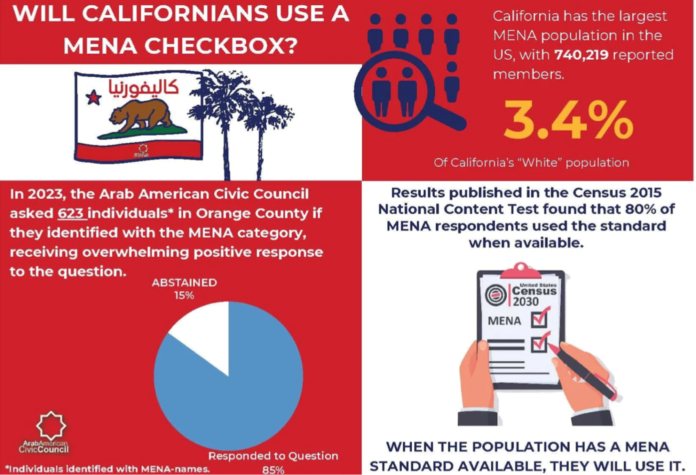
By Macy Meinhardt, Voice & Viewpoint Staff Writer
San Diego is home to one of the largest populations of Middle Eastern and North African communities (MENA) in the state, but the government’s record of their data is entirely “inadequate”, lawmakers say. In fact, in 2024, official census records still categorize this community as white.
Despite bolstering a wealth of culture and nuance, data for MENA-identifying citizens, which locally is about 40,000, is severely underreported due to the lack of their distinct demographic category. This means, any faceted data that comes up in regards to this community’s health, education, and socioeconomics, has historically been commingled with white-identified individuals —making it difficult to numerically address any evidence of disparity and discrimination.
But now there is a bill seeking to correct that.
AB 2763–The California MENA Inclusion Act—will require a MENA category to be included in all future collections of demographic data concerning ethnic background across all California state departments. Introduced last month by Lebanese Assemblymember Bill Essayli, the following ethnicities are slated to have their own identity legitimized by US documents if the bill goes through.
-
- Middle Eastern: Afghan, Bahraini, Emirati, Iranian, Iraqi, Israeli, Jordanian, Kuwaiti, Lebanese, Omani, Palestinian, Qatari, Saudi Arabian, Syrian, Turkish, and Yemeni.
- North African: Algerian, Djiboutian, Egyptian, Libyan, Mauritanian, Moroccan, Sudanese, and Tunisian.
- Transnational Middle Eastern and North African: Amazigh or Berber, Armenian, Assyrian, Chaldean, Circassian, & Kurdish
In addition, “It is important to know that the MENA Category is an ethnic category, not a racial category, as people from the MENA region can identify with any racial group and represent numerous diverse populations; according to the Arab American Civic Council.
Why This Matters
“WHAT IS NOT MEASURED CANNOT BE IMPROVED.”
For example, there has been robust research outlining disparities between white and Black students in public education spheres; including research on disparities in San Diego public schools. As a result, this informed data has been put into action through the establishment of culturally sensitive resources and opportunities for Black children in order to help them succeed; from behavioral health services to scholarships. However since there is no data for MENA identifying students, they frequently aren’t afforded similar opportunities.
Furthermore, in terms of hate crimes, Rachel Evans, youth programs manager at San Diego-based Somali Family Services worries that “If children in our community experience a hate crime at their school, currently, there’s no way to record it. Subsequently, they will not have access to culturally appropriate mental health services who can address the trauma they have experienced.”
“Organizations and leadership that work closely with the MENA population cannot provide crucial interventions to improve the quality of life for their population without recognition of the MENA population and effective data,” Essayli states.
Community specific health concerns are also underreported. But, based on a study published in the American Public Health Association, a growing body of research shows that MENA Americans have both health and social patterns distinct from those of Whites. For example, studies that have been performed indicate that Arab/MENA Americans have a higher prevalence of metabolic disorders, cardiovascular disease, as well as low birth weight and depressive symptoms.
“Arab Americans are in an unusual position in the American health care system — they are a group that both exists in the public consciousness, but is also un-counted, and hence has not been a part of a national reckoning with its needs and particularities,” according to a literature review about the health of Arab Americans in the U.S
Another area that makes census records vital is within the distribution of federal funds. Census results dictate the annual distribution of more than $675 billion through government programs. For historically marginalized communities, funding derived from census records are supportive “lifelines”. But, because they have been classified as White in the U.S. Census, residents who trace their ancestry to the Middle East and North Africa region rarely benefit from government assistance.
Therefore, through this proposed bill, “California’s recognition of the community is an essential step to repair decades of disenfranchisement and erasure on an administrative level,” said Abed Ayoub, Executive Director of American Arab Anti-Discrimination Committee.
“For far too long, MENA-Americans have been invisible, marginalized, and misrepresented. With this bill, we, as MENA-Americans in California, are speaking for ourselves and declaring boldly that we must be represented too,” said Sophia Armen, Executive Director, Armenian-American Action Network.
This resource is supported in whole or in part by funding provided by the State of California, administered by the California State Library in partnership with the California Department of Social Services and the California Commission on Asian and Pacific Islander American Affairs as part of the Stop the Hate program. To report a hate incident or hate crime and get support, go to https://www.cavshate.org//


